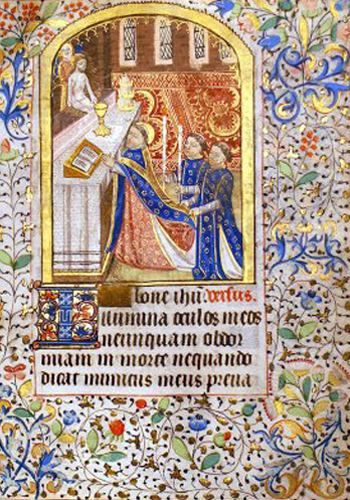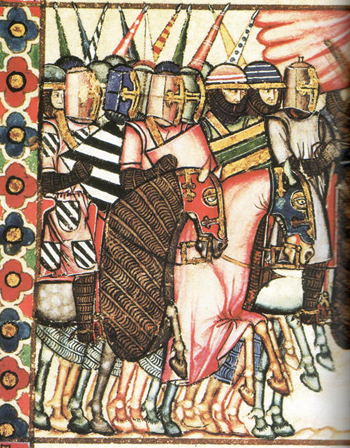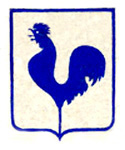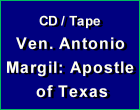Stories & Legends
 |
 |
 |
 |
 |
 |
 |
The Victory of Pascal Vives
In The History of Spain (Historia de España), the Spanish Jesuit Fr. Juan de Mariana (1536-1624) speaks of a Spanish warrior named Pascal Vives who had a great devotion to the Holy Mass and assisted daily at one or more.
It happened that while he was serving under the standard of the Count of Castile, a large body of Moors, who had already conquered the greater part of Spain, laid seige to the castle of the Count. The garrison, being totally unprepared to stand a siege, were reduced to dire distress, and the Count resolved to make a sally with all his men and risk their lives in a desperate attempt to drive back the Moors.
 The next morning the Count with all his soldiers heard Mass. Then, trusting in the divine assistance, they sallied forth against his enemies. But Pascal Vives remained in the church and heard eight Masses, one after another, praying fervently that victory might be on the Count's side.
The next morning the Count with all his soldiers heard Mass. Then, trusting in the divine assistance, they sallied forth against his enemies. But Pascal Vives remained in the church and heard eight Masses, one after another, praying fervently that victory might be on the Count's side.
While he prayed thus and his comrades fought, the latter saw Pascal Vives mounted on his charger making a gallant onslaught upon the Moors, hewing them down on every side! Calling to the soldiers to follow him, Pascal Vives fearlessly broke the ranks of the enemy, carried off their colors and wrought great havoc amongst them.
The contest lasted nearly four hours, only ceasing at the time when the eighth Mass, at which Pascal had assisted, was ended. The Moors were completely routed. The victory was universally ascribed to Pascal's heroic bravery, and the Count gave orders that he should have all the honor of it.
But, when all was over Pascal had disappeared. He was sought for all over the battlefield, but nowhere was he to be found. The fact was he had stayed in the church, and there he ramained almost all day. For he was ashamed to leave it, fearing lest the soldiers should mock him for a coward and the Count dismiss him from his service. No tidings of the battle had reached him and he did not know which side had gained the day.
Presently the Count, thinking it likely that Pascal had gone to the church to give thanks to Almighty God for the victory, bade his followers go there in search of him. Pascal was accordingly found and brought into the presece of the Count and his officers.
 When all began to compliment him on his prowess and say that the victory they had won was, under God, to be ascribed to him, he was perfectly astonished and knew not what to say. After a short space, interiorly enlightened by God, he confessed the truth, declaring that he had taken no part in the contest, but had during the whole time been in the church where he had heard eight Masses.
When all began to compliment him on his prowess and say that the victory they had won was, under God, to be ascribed to him, he was perfectly astonished and knew not what to say. After a short space, interiorly enlightened by God, he confessed the truth, declaring that he had taken no part in the contest, but had during the whole time been in the church where he had heard eight Masses.
The soldiers would not believe what he said, persisting that they had seen him with their own eyes in the thick of the fray and had heard him calling on them to fight valiantly.
Then Pascal answered: "If it really is as you say, the brave knight who bore my semblance must have been my Guardian Angel, for I assure you I have not been out of the church today. Praise God with me and give thanks to Him from your hearts for having sent you an Angel, with whose assistance you were enabled to vanquish the foe.
"But learn from this how pleasing it is to God that we should assist at Mass, and how profitable it is to us, for I am convinced that had I not heard those Masses, my Angel would not have appeared to you and led you on to so signal a victory."
In these and other words he exhorted the soldiers to be very fervent in hearing Mass.


It happened that while he was serving under the standard of the Count of Castile, a large body of Moors, who had already conquered the greater part of Spain, laid seige to the castle of the Count. The garrison, being totally unprepared to stand a siege, were reduced to dire distress, and the Count resolved to make a sally with all his men and risk their lives in a desperate attempt to drive back the Moors.

Pascal Vives remained in the Church to hear more Masses
While he prayed thus and his comrades fought, the latter saw Pascal Vives mounted on his charger making a gallant onslaught upon the Moors, hewing them down on every side! Calling to the soldiers to follow him, Pascal Vives fearlessly broke the ranks of the enemy, carried off their colors and wrought great havoc amongst them.
The contest lasted nearly four hours, only ceasing at the time when the eighth Mass, at which Pascal had assisted, was ended. The Moors were completely routed. The victory was universally ascribed to Pascal's heroic bravery, and the Count gave orders that he should have all the honor of it.
But, when all was over Pascal had disappeared. He was sought for all over the battlefield, but nowhere was he to be found. The fact was he had stayed in the church, and there he ramained almost all day. For he was ashamed to leave it, fearing lest the soldiers should mock him for a coward and the Count dismiss him from his service. No tidings of the battle had reached him and he did not know which side had gained the day.
Presently the Count, thinking it likely that Pascal had gone to the church to give thanks to Almighty God for the victory, bade his followers go there in search of him. Pascal was accordingly found and brought into the presece of the Count and his officers.

The soldiers would not believe what he said, persisting that they had seen him with their own eyes in the thick of the fray and had heard him calling on them to fight valiantly.
Then Pascal answered: "If it really is as you say, the brave knight who bore my semblance must have been my Guardian Angel, for I assure you I have not been out of the church today. Praise God with me and give thanks to Him from your hearts for having sent you an Angel, with whose assistance you were enabled to vanquish the foe.
"But learn from this how pleasing it is to God that we should assist at Mass, and how profitable it is to us, for I am convinced that had I not heard those Masses, my Angel would not have appeared to you and led you on to so signal a victory."
In these and other words he exhorted the soldiers to be very fervent in hearing Mass.

Excerpt from Cochem's Explanation of the Holy Sacrifice of the Mass,
Benzinger Bros.: 1896, pp. 215-217
Posted September 16, 2017
Benzinger Bros.: 1896, pp. 215-217
Posted September 16, 2017






